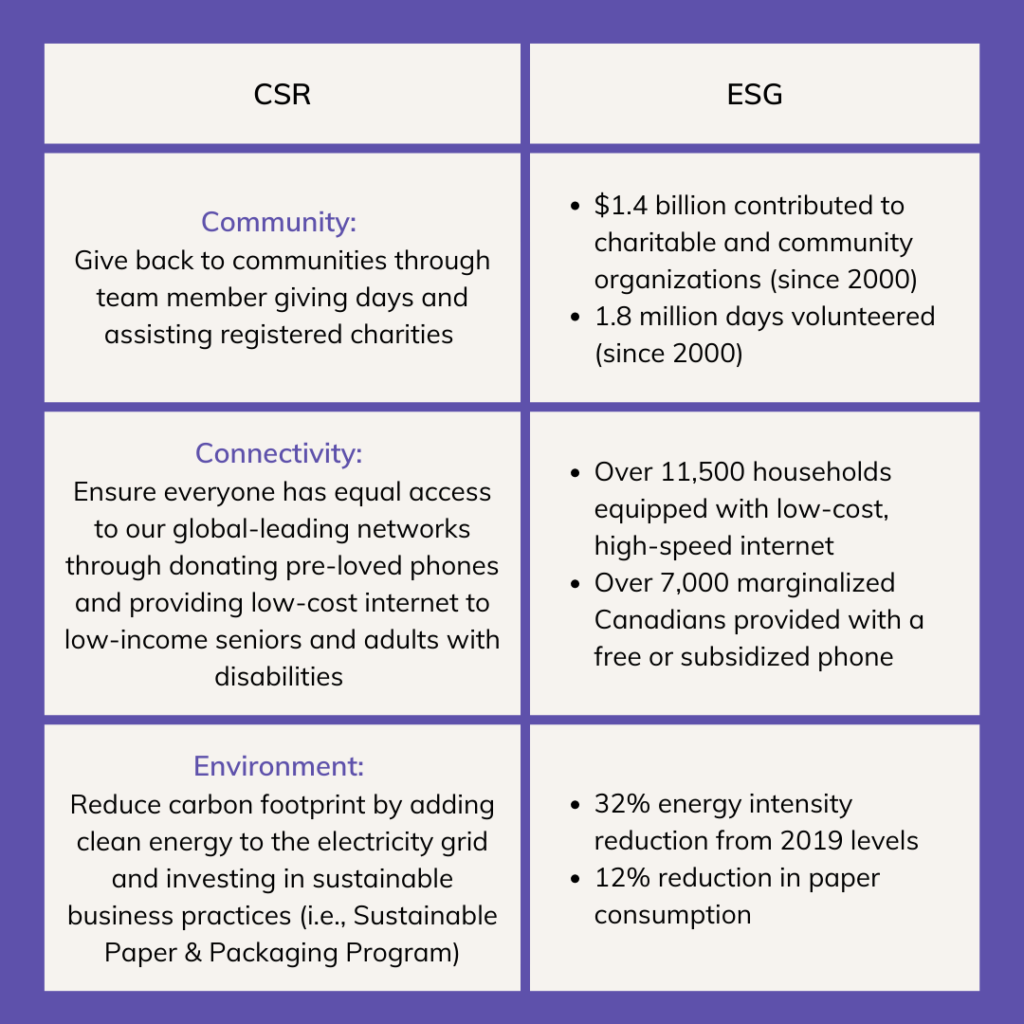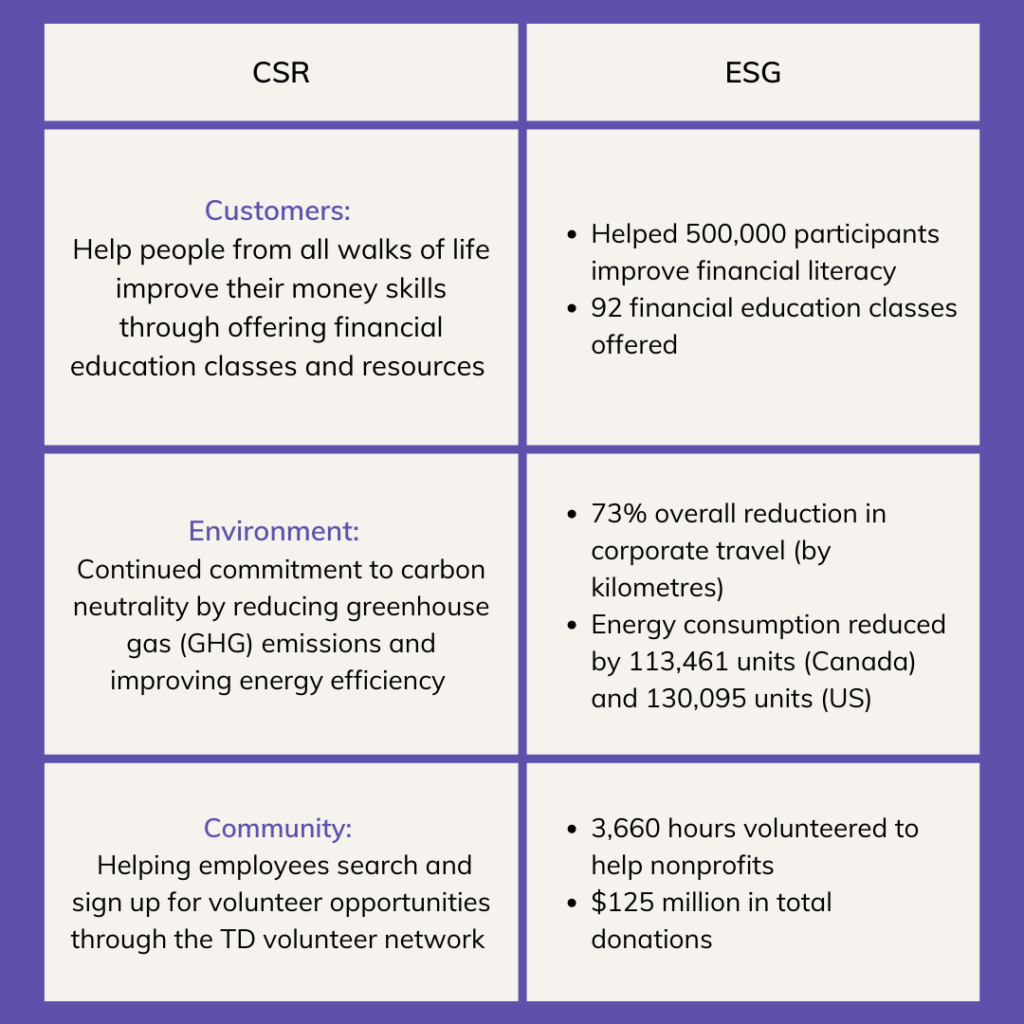Building a company culture that focuses beyond profit is now more crucial than ever. Stakeholders want to get behind companies that are aligned with their values and promote positive social change.
93% of employees believe companies must lead with a purpose, and 94% of customers said that it’s important for the companies they engage with to have a strong purpose.
As businesses strive to make a difference globally and locally and demonstrate their commitment to changing the world, CSR (Corporate Social Responsibility) and ESG (Environmental Social Governance) are often used interchangeably.
Although both terms focus on non-financial factors related to a business, they differ in several important ways. This blog will explain the differences between the two terms and highlight a few companies successfully implementing both CSR and ESG into their corporate strategy.
CSR- Corporate Social Responsibility
CSR focuses on communicating a company’s initiatives to all its stakeholders: employees, customers, investors, and community supporters. CSR is a common practice that any sized company, from small businesses to enterprises, should embrace for stable growth.
CSR initiatives are the actions companies take to improve social and environmental issues: such as engaging in the community, reducing carbon footprint, and increasing charitable giving efforts.
When CSR initiatives are publicly highlighted on a company’s corporate website or in press releases, not only will accountability flourish, but this practice increases loyalty and brand equity.
As stakeholders look to support purpose-driven businesses, companies must put change at the forefront of their business operations and, more importantly, communicate what they are doing to make change happen.
ESG- Environmental Social Governance
While CSR communicates initiatives, ESG is the next evolution of this, measuring how well a business adheres to these initiatives through the inclusion of data-driven reports. Historically, CSR reports existed; however, they only provided minimal insight into a company’s impact and weren’t as analytical as ESG reports are today.
With ESG reporting, quantitative evidence is used to measure a company’s progress on specific initiatives. For instance, a company may outline the actions it is taking to become more environmentally sustainable on its CSR landing page; however, its ESG report will show the percentage of GHG emissions reduced to date.
The data from ESG reports are often used as an indicator to help investors gauge whether a company will be a viable investment, with 85% of investors considering ESG factors in their 2020 investments. Furthermore, ESG reports influence consumers’ purchasing decisions, as 76% of consumers said they would discontinue relations with companies that treat employees, the community, and the environment poorly.
Example: Wells Fargo
Wells Fargo’s CSR initiatives focus on areas of diversity & inclusion, community giving, environmental sustainability, and economic empowerment. The company’s 2021 ESG Report reflects its progress toward its CSR initiatives.
One of Wells Fargo’s diversity & inclusion initiatives is to establish and support partnerships with the diverse business community. The 2021 ESG report demonstrates that Wells Fargo increased its annual spending with diverse suppliers by $576 million.
Examples: Telus
The below table depicts the relationship between Telus’ CSR initiatives and its 2021 ESG Report. Telus provides insight into what they are doing to improve the community, connectivity, and the environment. Its 2021 ESG report demonstrates how well they have complied with these efforts through quantifiable metrics.

Example: TD Canada Trust
Similar to the example above, TD’s 2021 ESG Report helps stakeholders evaluate the effectiveness of the company’s CSR initiatives, as outlined in the table below.

Kambeo Hubs: Combining CSR & ESG In One Platform
Tim Fern, CEO at Kambeo, states: “Kambeo Hubs presents a unique opportunity for a company and its employees to tell the story about the work they’re doing to make the world a better place. Our platform is designed to connect employees with opportunities to give back and measure the impact of their efforts.”
Learn more about how Kambeo Hubs enables your business to transparently communicate initiatives around ‘doing good,’ execute them effectively, and demonstrate progress in real time through authentic data.



